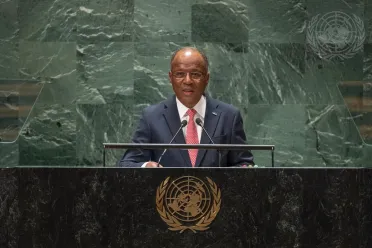Statement
Statement summary
JOSÉ ULISSES CORREIA E SILVA, Prime Minister of Cabo Verde, emphasized that the international community must mobilize towards peace, prosperity, progress and sustainability for all. The world has experienced a period of intense crises, including a resurgence of populism and extremism, attacks on democracy, coups d’état in African States and the war in Ukraine. Condemning the overthrows of Governments and the Russian Federation’s aggression, he declared that Cabo Verde stands for values and principles of freedom, sovereignty and territorial integrity, as well as liberal constitutional democracy. While two thirds of Africans prefer democracy, only 38 per cent are satisfied with how this system of government works in their countries, he observed, pointing to a disconnect between the authorities and the citizens. Nevertheless, the latter’s preference for democracy is an opportunity for good governance, more citizen empowerment, fighting corruption, achieving transparency and enacting policies that create trust and hope.
Credible and trustworthy electoral and judicial systems, freedom of the press promoting pluralism and strong institutions are key to preventing conflict and strengthening democracy, he stressed. Cabo Verde is thus committed to working with all States to address insecurity in West Africa and beyond. Expressing hope that creating a safer world is possible, he emphasized that joint efforts are vital to overcome current complex threats to international security. To that end, conflict prevention, conflict resolution and post-conflict reconstruction are integral parts of achieving the Sustainable Development Goals. As challenges to meeting those Goals have expanded, he urged world leaders to accelerate reforms, investments, financing, partnerships and solidarity. In this regard, he called for the reform of the international financial architecture, operationalization of climate and environmental funding instruments and enhancement of special drawing rights, as well as debt relief to least developed countries.
African countries should have a fair and relevant representation in the Security Council and the international financial institutions, including the World Bank and the International Monetary Fund (IMF), he continued. The world also needs to move forward on the Multidimensional Vulnerability Index and its application as a criterion for accessing low-cost and long-term financing for small island developing States. While external factors play a significant role, development is only achievable with a strong dedication of Governments, citizens, companies and civil society organizations in each country. More so, Africa must be more integrated into the global economy to produce, export, create well-paid jobs, eradicate extreme poverty and ensure happiness of its people. The continent thus requires a focus on human capital and structural economic transformation to diversify economies, increase competitiveness, reduce vulnerabilities and strengthen connectivity.
In order to produce a significant impact, long-term transformative investments require concessional funding, predictability, scale-up effects and adequate execution time, he noted. However, the weight of foreign debt, the levels of sovereign risks and the financing conditions for African countries and companies block their path towards development. Drawing attention to one of the solutions, he announced that Cabo Verde and Portugal recently signed an agreement to convert bilateral debt into climate and environmental financing. This can free up resources for investments that increase resilience, reduce exposure to external shocks, lower carbon emissions, protect biodiversity, generate investment opportunities for the private sector and create skilled job opportunities for youth. Reiterating his country’s commitment to the 2030 Agenda, he reported that its implementation is guided by a second national plan for sustainable development. Cabo Verde is determined to eradicate poverty by 2026, accelerate energy transition and transform into a digital nation, he stated.
Full statement
Read the full statement, in PDF format.
Photo

Previous sessions
Access the statements from previous sessions.
